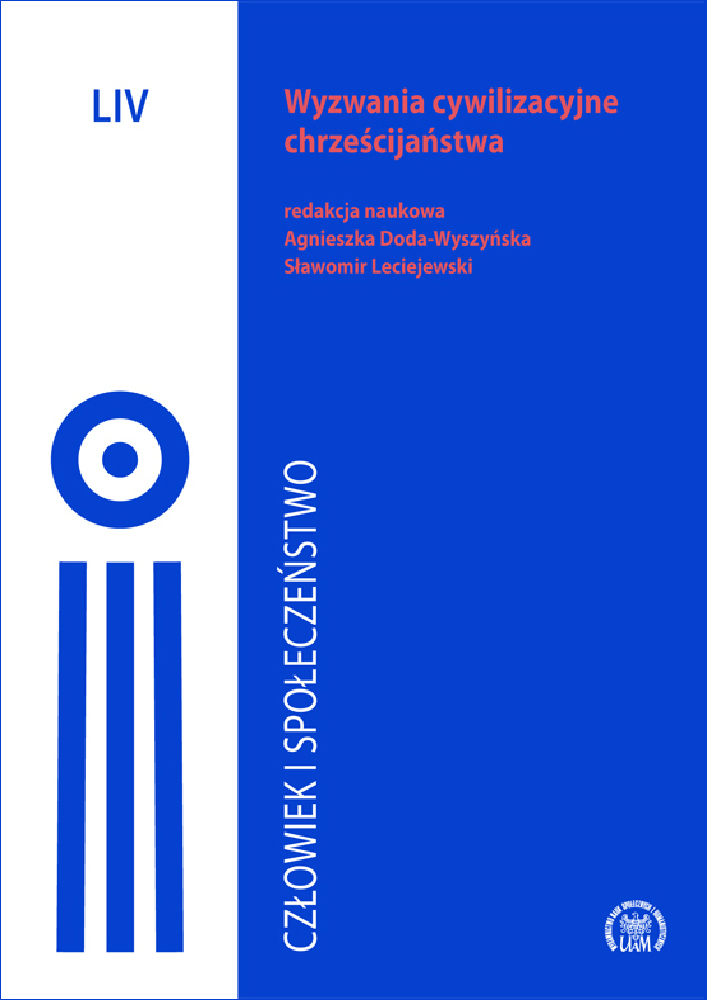Abstract
This article focuses primarily on a synthetic presentation of the global process of pentecostalization as well as the analysis of the selected religious abuses that occur in Christian communities on the grounds of emotional and syncretic Pentecostal religiosity. Over the last two decades, the interest in the problem of psychomanipulation and religious abuses has grown significantly in the Catholic Church and in other Christian denominations. This phenomenon is subject to in-depth philosophical, psychological, sociological, theological and cultural analyses, particularly in countries such as the United States, France or Great Britain. Religious abuse, also known as spiritual abuse or spiritual violence, refers to various forms of psychomanipulation, power, and control over people through religion, faith, or beliefs. The risk of abuse is especially high in the context of contemporary syncretic Neo-Pentecostal religiosity which is characterized by the so-called praying in tongues, miracles, emphasizing the presence of the devil in the world, exorcisms, prayers of deliverance, healings, introducing participants of prayer meetings into altered states of consciousness, etc. In the application of such methods, the principle of informed consent, which in medical practice applies to the relationship between doctors and patients, should be one of the basic ethical norms implemented with the aim of protecting against religious abuse and regulating the relationship of leaders to members of their communities.
References
Anderson, A.H. (2013). An Introduction to Pentecostalism: Global Charismatic Christianity, Cambridge: Cambridge University Press. https://doi.org/10.1017/CBO9781139524063 DOI: https://doi.org/10.1017/CBO9781139524063
Botha, E. (2007). The New Reformation: The Amazing Rise of the Pentecostal-Charismatic Movement in the 20th Century. Studia Historiae Ecclesiasticae, 33(1), 295–325.
Bowler, K. (2018). Blessed: A History of the American Prosperity Gospel. New York: Oxford University Press.
Collectif CCMM. (2012). Détournement de méninges. Le livre noir de l’emprise psycho-spirituelle. Paris: CCMM-Roger Ikor.
Duda, S. (2021). Duchowa i psychiczna transgresja Pawła M. Portal informacyjny Więź pl, 26.03.2021. https://wiez.pl/2021/03/26/pawel-m-transgresja/ (dostęp: 12.08.2022).
Gavendová, O. (2014). Nihilizmus ako východisko pre náboženskú skúsenosť. Theologos, 1, 86–96.
Hoyeau, C. (2021). La trahison des pères. Emprise et abus des fondateurs de communautés nouvelles. Montrouge: Bayard Adulte.
Jenkins, Ph. (2011). The Next Christendom: The Coming of Global Christianity. New York: Oxford University Press.
Kobyliński, A. (2014). Etyczne aspekty współczesnej pentekostalizacji chrześcijaństwa. Studia Philosophiae Christianae, 50(3), 93–130.
Kobyliński, A. (2016). The Global Pentecostalization of Christianity and Its Ethical Con- sequences. Chicago Studies, 55(2), 98–118.
Kobyliński, A. (2021). Ethical Aspects of the Prosperity Gospel in the Light of the Argu- ments Presented by Antonio Spadaro and Marcelo Figueroa. Religions, 12(11)996, 1–16. https://doi.org/10.3390/rel12110996. DOI: https://doi.org/10.3390/rel12110996
Kućko, W. (2020). Wyzwania etyczne „teologii dobrobytu” w świetle nauczania papieża Franciszka. Studia Nauk Teologicznych PAN, 15, 53–71. https://doi.org/10.31743/snt.8796. DOI: https://doi.org/10.31743/snt.8796
Landron, O. (2004). Les Communautés nouvelles. Nouveaux visages du catholicisme. Paris: Editions du Cerf.
Nyske, E. (2021). Grave Soaking: Christian necromancy among the disciples of the New Apostolic Reformation. The Religious Studies Review, 280(2): 109–124. https://doi.org/10.34813/ptr2.2021.3.
Oakley, L., Humphreys, J. (2019). Escaping the Maze of Spiritual Abuse: Creating Healthy Christian Cultures, London: SPCK Publishing. https://doi.org/10.1057/9781137282873
Oakley, L., Kinmond, K. (2013). Breaking the Silence on Spiritual Abuse, London: Pal- grave Macmillan. DOI: https://doi.org/10.1057/9781137282873
Pignier, F. (2011). Les dérives sectaires face au droit français. Paris: CCMM-Roger Ikor. Planet, A. (2019). Il rapporto dell’episcopato francese. Contro gli abusi di potere. L’Osservatore Romano, 159(138), 6.
Planet, A. (2021). L’essentiel des signalements pour dérives sectaires porte sur des communautés nouvelles – rozmowę prowadzi Céline Hoyeau. La Croix, 1.07.2021. https://www.la-croix.com/Religion/Mgr-Alain-Planet-Lessentiel-signalements-derives-sec-taires-porte-communautes-nouvelles-2021-07-01-1201164251 (dostęp: 12.08.2022).
Sadowski, R.F. (2020). Resources Within Spiritual and Mystical Christian Traditions for the Care of Earth – our Common Home. Studia Ecologiae et Bioethicae, 18(1), 43–53. https://doi.org/10.21697/seb.2020.1.05. DOI: https://doi.org/10.21697/seb.2020.1.05
Spadaro, A., Figueroa, M. (2018). The Prosperity Gospel: Dangerous and Different. La Civiltà Cattolica, 4034, III, 105–118.
Vadíková, K.M. (2022). On the Transformation of Thinking on Personal Responsibility Towards Requirements of Environmental Ethics in Slovakia. Studia Ecologiae et Bio- ethicae, 20(2), 15–25. https://doi.org/10.21697/seb.2022.11. DOI: https://doi.org/10.21697/seb.2022.11
Vondey, W. (2013). Pentecostalism: A Guide for the Perplexed. Edynburg: T&T Clark Publishing.
Waleszczyński, A. (2019). Między troską a sprawiedliwością: Virginii Held poglądy na wspólnotę polityczną. Roczniki Filozoficzne, 67(3), 115–135. https://doi.org/10.18290/rf.2019.67.3-6. DOI: https://doi.org/10.18290/rf.2019.67.3-6
License
Copyright (c) 2023 Andrzej Kobyliński

This work is licensed under a Creative Commons Attribution 4.0 International License.
1. W momencie złożenia pracy celem rozpoczęcia postępowania w sprawie publikacji, Licencjodawca, zwany dalej Autorem, akceptuje wszystkie zasady umieszczone na stronie internetowej czasopisma “Człowiek i Społeczeństwo”, udzielając Licencjobiorcy, zwanego dalej Wydawcą, niewyłącznej i nieodpłatnej licencji na korzystanie z Utworu. Licencja zakłada tym samym brak ograniczeń terytorialnych, czasowych oraz ilościowych na następujących polach eksploatacji (art. 50 ustawy z dnia 4 lutego 1994 r. o prawie autorskim i prawach pokrewnych):
a. utrwalanie Utworu;
b. zwielokrotnienie Utworu drukiem i w wersji cyfrowej;
c. wprowadzenie do obrotu, użyczenie lub najem oryginału/zwielokrotnionych egzemplarzy Utworu;
d. publiczne wykonanie, wystawienie, wyświetlenie, odtworzenie oraz nadawanie i reemitowanie, a także publiczne udostępnianie Utworu w taki sposób, aby każdy mógł mieć do niego dostęp w miejscu i w czasie przez siebie wybranym;
e. włączenie Utworu w skład utworu zbiorowego;
f. wprowadzenie Utworu w postaci elektronicznej na platformy elektroniczne lub inne wprowadzenie Utworu w postaci elektronicznej do Internetu, Intranetu, Extranetu lub innej sieci;
g. rozpowszechnianie Utworu w wersji elektronicznej w Internecie, Intranecie, Extranecie lub innej sieci, w pracy zbiorowej, a także samodzielnie w formule Open Access w oparciu o licencję Creative Commons Uznanie autorstwa 4.0 Międzynarodowa Licencja Publiczna (CC BY 4.0), a także inną wersję językową tej licencji, lub którąkolwiek późniejszą wersję tej licencji.
2. Założenia licencji Creative Commons Uznanie autorstwa 4.0 Międzynarodowa Licencja Publiczna (CC BY 4.0), udzielają Wydawcy upoważnienia do kopiowania, zmieniania, rozprowadzania, przedstawiania i wykonywania Utworu jedynie pod warunkiem uznania autorstwa.
3. Wraz z dostarczeniem Utworu, Autor zobowiązuje się do wypełnienia, podpisania oraz odesłania skanu umowy

